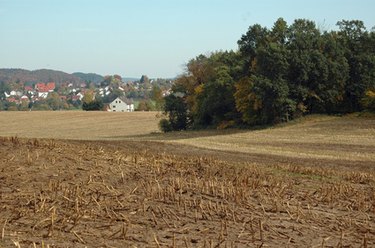
Within the agricultural industry, fertilizers provide an effective means for increasing crop yields. Fertilizer usage is a widespread practice that poses potential dangers to the health of humans as well as to the environment. Excess chemicals from fertilizer applications, known as runoff, can contaminate surface and groundwater supplies, which ultimately affects the quality of drinking water and the quality of crops produced.
Groundwater Contamination
Video of the Day
Repeated applications of fertilizer to large crops can take a toll on the surrounding soil environment. Fertilizer materials consist of concentrated mixes of nitrogen, phosphorous and potassium, which can strain soil ecosystems over time. Nitrogen, in particular, is a highly water-soluble material that can quickly move through soil layers, according to Parkseed, a gardening resource site.
Video of the Day
In addition to fertilizer materials, agricultural producers typically use pesticide agents to prevent insects, bacteria and fungus from destroying crop yields, according to Pest Management at the Crossroads, a pesticide reference site. When combined, fertilizers and pesticides can further strain soil environments, causing excess chemicals to seep into groundwater supplies and, ultimately, contaminate public drinking water supplies.
Nitrate Concentration
According to the Agency for Toxic Substances and Disease Registry, the chemicals used in the making of commercial fertilizers create high concentrations of nitrate compounds within the soil. Nitrates are naturally occurring ions that form when organic nitrogen materials decompose in the soil. Nitrate ions act as chemically charged molecules that offset the natural balance within a soil environment. Nitrates can have the same effects on the human body as well as in plant and animal bodies, according to Pest Management at the Crossroads. Over time, nitrates can accumulate inside the body and eventually disrupt normal functions within the body's endocrine, neurological and immune systems. Nitrates pose a particularly dangerous threat to fetal development and infant health in terms of brain and immune system development.
Food Contamination
As fertilizers seep into groundwater supplies and permeate soil ecosystems, both water and plant crops absorb the nitrates in the soil. Certain vegetables, such as spinach, broccoli and cauliflower, naturally absorb more nitrate materials than other plant types. According to the Agency for Toxic Substances and Disease Registry, the vegetables consumed by humans provide as much as 70 percent of the nitrates present within a daily diet. Food contamination also occurs in the form of color-enhancing agents, which are used as meat preservatives. Commercial baby food products as well as the water used to dilute baby formula also contain nitrate materials.
- Pest Management at the Crossroads: Pesticide, Fertilizer Mixes Linked to Range of Health Problems
- Parkseed: What is fertilizer and how does it work?
- Agency for Toxic Substances & Disease Registry: Nitrate/Nitrite Toxicity
- EarthTimes: Study Shows Lawn Fertilizers & Chemicals Could Increase Risk for Cancer Among Men